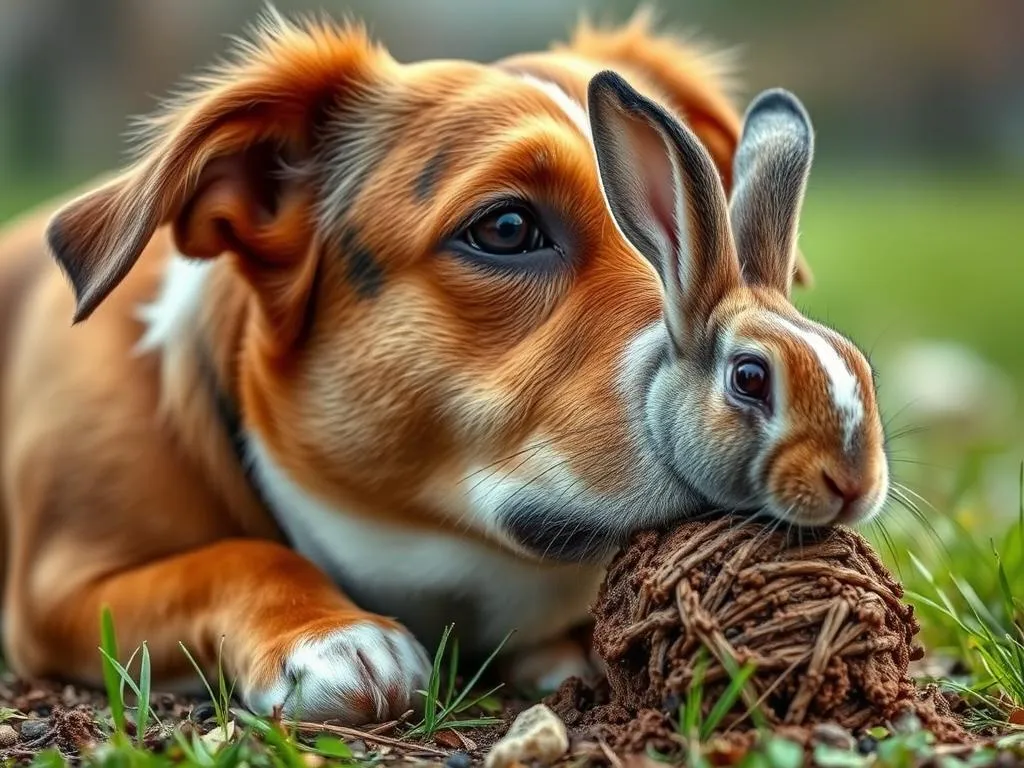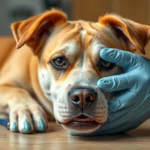
It’s a scenario that many dog owners dread: you step outside only to catch your furry friend munching on something they shouldn’t—rabbit poop. While this behavior can be alarming, it’s essential to approach the situation with understanding and knowledge. Dogs are known for their curious and sometimes indiscriminate eating habits, leading to many questions about their health and safety.
Understanding why dogs engage in this behavior and what it means for their health is crucial for any pet owner. This article delves into the reasons behind coprophagia (the technical term for eating feces), the specific appeal of rabbit poop, potential health risks, and what you should do if your dog has indulged. We’ll also cover preventive measures and alternative solutions to help you manage this concerning behavior.
Understanding the Behavior
Why Do Dogs Eat Poop?
Dogs are naturally curious creatures, and their exploratory nature often leads them to taste things that seem unappetizing to us. Coprophagia can occur for various reasons, including:
- Instinctual Behavior: In the wild, canines may consume feces to keep their dens clean or to avoid attracting predators. Puppies, in particular, may mimic this behavior if they observe their mothers doing it.
- Nutritional Deficiencies: Sometimes, dogs eat poop because they are lacking certain nutrients in their diet. This can lead them to seek out feces that may contain undigested food particles or nutrients.
- Attention-Seeking: If a dog notices that eating poop gets a strong reaction from their owner, they may continue the behavior to gain attention, even if it’s negative.
- Boredom or Anxiety: Dogs that are bored or anxious may engage in coprophagia as a way to cope with their stress or lack of stimulation.
Specifics About Rabbit Poop
Rabbit poop, or rabbit droppings, holds a particular appeal for dogs. Unlike other feces, rabbit droppings are small, round, and often dry, making them easy for dogs to consume. Here are a few reasons why rabbit poop may be particularly enticing:
- Nutritional Content: Rabbit feces are high in fiber and may contain remnants of undigested plant material. This can attract dogs who are instinctively drawn to the smell of food.
- Lack of Strong Odor: Unlike the feces of other animals, rabbit poop often has a milder smell, making it less off-putting for dogs.
- Curiosity: Dogs are naturally curious about their environment, and the presence of rabbit droppings can pique their interest, leading them to investigate further.
Potential Health Risks
Immediate Risks
While the behavior may seem harmless at first, there are immediate risks associated with dogs consuming rabbit poop. The primary concerns include:
- Parasites: Rabbit feces can harbor various parasites, including Giardia, Coccidia, and worms like Echinococcus. These parasites can lead to gastrointestinal issues in dogs.
- Pathogens: Rabbit droppings can also contain harmful bacteria and pathogens that can cause infections in dogs, leading to symptoms such as vomiting and diarrhea.
Long-term Health Effects
If your dog continues to eat rabbit poop, there can be long-term health implications:
- Gastrointestinal Problems: Continuous consumption of feces can upset your dog’s digestive system, leading to chronic diarrhea or vomiting.
- Infections: Prolonged exposure to parasites or pathogens can result in more severe health issues, including systemic infections that may require extensive veterinary treatment.
- Behavioral Issues: Coprophagia can become a habitual behavior, and breaking this cycle may require significant effort and training.
When to Consult a Veterinarian
Signs to Look Out For
If your dog has eaten rabbit poop, it’s crucial to monitor their health closely. Look for symptoms such as:
- Vomiting: Repeated vomiting can indicate gastrointestinal distress.
- Diarrhea: Loose stools or diarrhea may signal an infection or irritation in the digestive tract.
- Lethargy: If your dog appears unusually tired or disinterested in their usual activities, it could be a sign of illness.
- Loss of Appetite: A sudden change in eating habits can indicate that something is wrong.
If you notice any of these symptoms, it’s essential to contact your veterinarian.
What to Expect During a Vet Visit
When you consult a veterinarian after your dog has eaten rabbit poop, the vet will typically conduct a thorough examination. Here’s what you can expect:
- Physical Examination: The vet will check your dog’s overall health, looking for signs of distress or illness.
- Diagnostic Tests: Depending on the symptoms, the vet may recommend tests such as blood work or stool samples to check for the presence of parasites or infections.
- Treatment Options: If necessary, your veterinarian may prescribe medications to treat any infections or gastrointestinal issues. They may also provide guidance on dietary changes or supplements.
Preventive Measures
Training Your Dog
One of the most effective ways to prevent coprophagia is through training. Here are some tips to discourage your dog from eating feces:
- Commands: Teach your dog commands like “leave it” or “drop it” to discourage them from eating something they shouldn’t. Practice these commands consistently to reinforce them.
- Positive Reinforcement: Reward your dog with treats and praise when they obey your commands. This will help them associate good behavior with positive outcomes.
Environmental Management
Controlling your dog’s environment can also help reduce their access to rabbit poop:
- Supervised Outdoor Time: When outside, keep a close eye on your dog. If you see them heading towards rabbit droppings, redirect their attention with a toy or treat.
- Fencing and Barriers: If there are areas in your yard where rabbits frequently visit, consider installing fencing or barriers to prevent your dog from accessing those spots.
Dietary Considerations
Your dog’s diet plays a significant role in their behavior. Here are some dietary adjustments to consider:
- High-Quality Dog Food: Feeding your dog a well-balanced, high-quality dog food can minimize the chances of nutritional deficiencies that may lead them to seek out feces.
- Consulting a Vet: If you suspect your dog’s diet is the cause of their behavior, consult your veterinarian for personalized dietary recommendations.
Alternative Solutions
Supplements and Products
There are several supplements and products designed to deter dogs from eating feces:
- Taste Aversion Products: Some products are formulated to make feces taste unpleasant to dogs. These can be added to your dog’s food to help discourage coprophagia.
- Digestive Enzymes: Supplements containing digestive enzymes can improve nutrient absorption, potentially reducing the urge to seek out feces.
Behavioral Modification Techniques
If training and environmental management are insufficient, consider behavioral modification techniques:
- Professional Help: A professional dog trainer or behaviorist can work with you to develop a tailored plan to address your dog’s coprophagia.
- Desensitization: Gradually exposing your dog to situations where they might encounter rabbit poop while positively reinforcing good behavior can help reduce their interest in feces over time.
Conclusion
Understanding the reasons behind your dog eating rabbit poop and the potential health risks involved is essential for any responsible pet owner. While it can be alarming to witness this behavior, remaining calm and taking appropriate action is crucial.
Monitor your dog for any concerning symptoms and consult your veterinarian if necessary. With proper training, environmental management, and dietary considerations, you can help curb this behavior and keep your furry friend healthy.
As you navigate this issue, remember that you’re not alone. Many dog owners face similar challenges, and with the right approach and support, it’s possible to manage your dog’s coprophagia effectively. Don’t hesitate to reach out to fellow dog owners or professionals in the field for advice and shared experiences.









